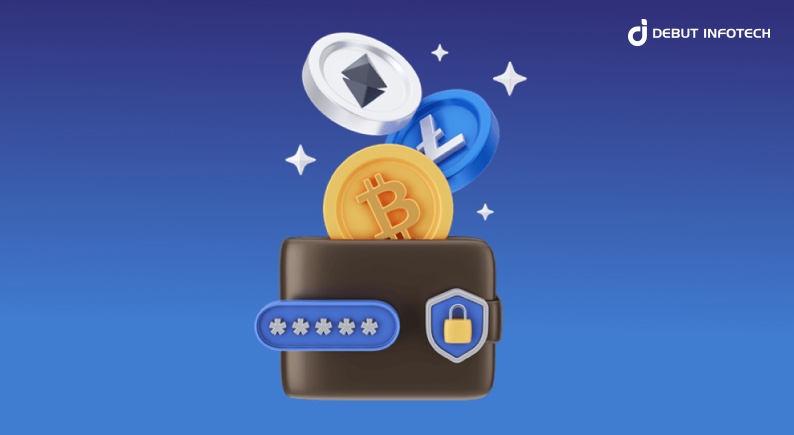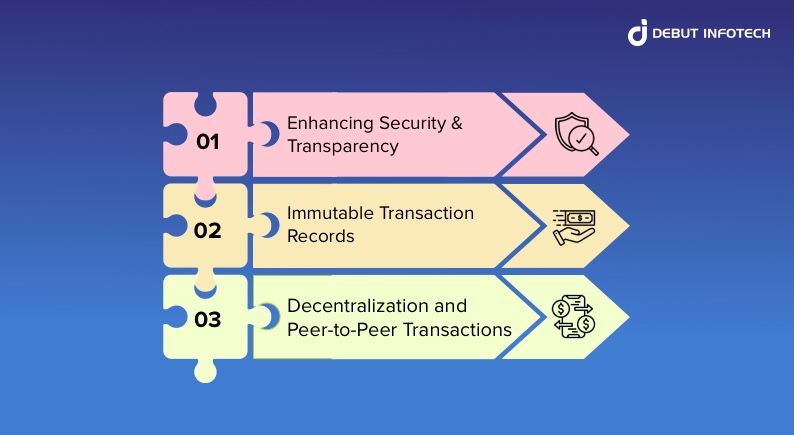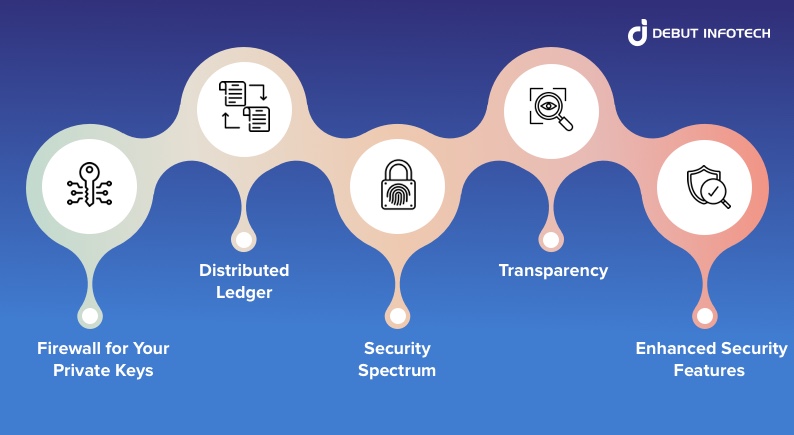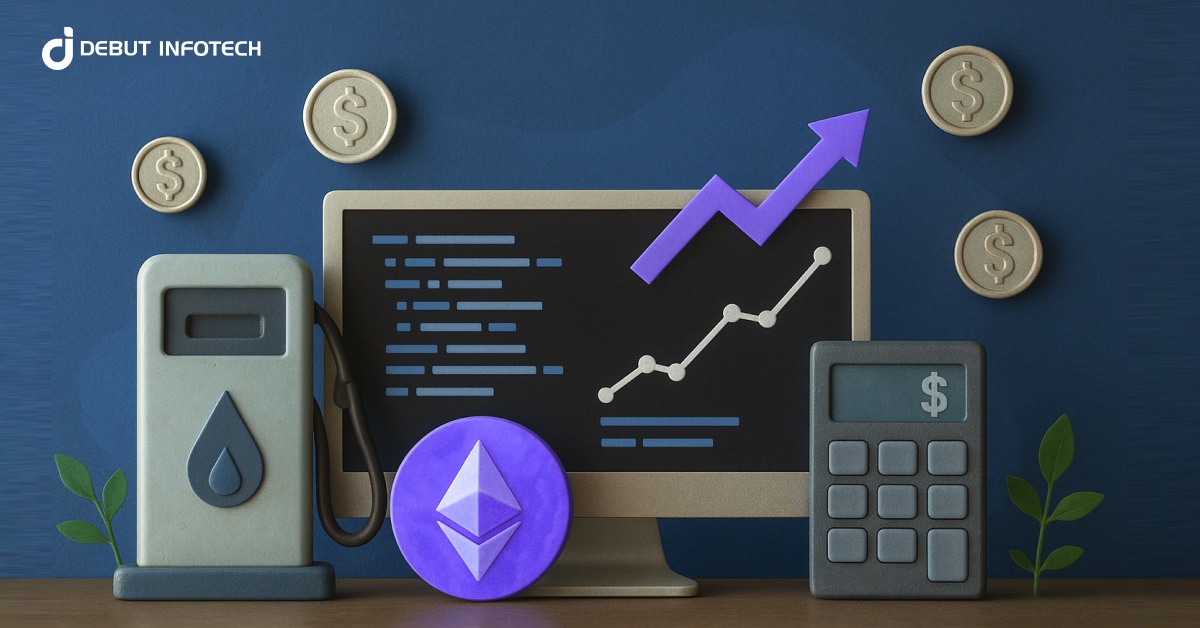
|
Getting your Trinity Audio player ready...
|
The financial environment has been completely transformed by the explosive rise of cryptocurrencies, which provide a safe, decentralized method of storing and transferring value. But protecting these digital assets is a vital requirement that comes along with innovation. Then there are crypto wallets, which are specialized software programs made to handle, store, and communicate with cryptocurrencies safely.
However, what supports these wallets’ strong security features? Blockchain development is a potent technological force that holds the key to the solution. We’ll talk about the crucial part blockchain technology plays in cryptocurrency wallet development in this blog post. We will reveal the ideas behind transparent transaction histories, safe key management, and cutting-edge security features—all made feasible by the wonders of blockchain technology.
So prepare to explore this amazing technology and learn how it serves as the foundation for safe cryptocurrency storage options.
Understanding The Blockchain Wallet

The public and private keys of users are stored in blockchain “cryptocurrency” wallets, which also offer a user-friendly interface for managing cryptocurrency balances. Additionally, they enable the blockchain to handle crypto transfers. With certain wallets, users can even buy and sell cryptocurrency assets or establish connections with decentralized applications.
It’s crucial to remember that utilizing a blockchain wallet differs from using a physical wallet in that the former does not store cryptocurrency. Put another way, sending “tokens” is how crypto transactions are carried out. Essentially, you are signing transactions with your private key and broadcasting them back to the blockchain network when you transmit tokens. To provide balanced details, wallets read the public ledger. They also store the private key, which lets the user do any required transactions.
Digital assets and cryptocurrency are assigned or saved to a wallet address. An address is a string of characters that is produced at random and serves as a kind of unique number, similar to a bank account number. The wallet’s public key is used to calculate the wallet address mathematically using a one-way process known as “hashing.” The wallet address is used to receive transactions of digital assets and can be shared with another individual.
Every Blockchain Wallet Has:
- A public key that allows the user to receive cryptocurrency transactions. It is public and available to anyone in the system
- A private key that proves ownership of the respective public key. It must be stored securely and remain secret.
A wallet can keep track of numerous token balances simultaneously. This means that many blockchain-compatible cryptocurrencies can be transacted with a single wallet. But wallets are even more beneficial than this; they let users exchange non-fungible tokens (NFTs). NFTs are essentially blockchain-stored authentication certificates that are used to represent easily replicable items, such as media and images.
Blockchain wallets impose “dynamic” fees, meaning that the amount charged for a transaction might change depending on several circumstances, such as the size of the transaction. For security reasons, each transaction in a wallet is cryptographically assigned. Those who plan to use and hold cryptocurrency for an extended period should give cybersecurity top priority because cryptocurrencies are accessible online and are part of a public digital ledger system.
How Blockchain Technology Revolutionizes Crypto Wallet Development

Undoubtedly, blockchain technology has profoundly transformed the finance and digital transaction landscape. Its impact extends far beyond cryptocurrencies, with one of its critical roles being in developing crypto wallets. As we delve into the fascinating realm of crypto wallet development, it becomes evident that blockchain is the bedrock, revolutionizing how we secure, manage, and transact with our digital assets.
Enhancing Security and Transparency
At the core of blockchain’s influence in crypto wallet development lies the unparalleled security it provides. Traditional financial systems often rely on centralized authorities, making them vulnerable to hacking and fraud. Conversely, blockchain operates on a decentralized network of nodes, ensuring that no single entity holds all the data or control.
Through its consensus mechanism, typically proof-of-work (PoW) or proof-of-stake (PoS), the blockchain validates and confirms each transaction, creating an immutable record in a transparent public ledger. This transparency fosters trust among users, as they can independently verify the integrity of any transaction within the network.
Immutable Transaction Records
Immutable transaction records are a crucial advantage of blockchain technology in crypto wallet development. Once a transaction is added to the blockchain, it becomes nearly impossible to alter or delete. This tamper-resistant property ensures high data integrity, making it exceedingly difficult for malicious actors to manipulate transaction history or misrepresent account balances.
This immutability also helps in disputes, as an indisputable record of all transactions is available for review. This feature streamlines auditing and regulatory compliance processes for businesses and financial institutions, further strengthening the credibility of blockchain-based crypto wallets.
Decentralization and Peer-to-Peer Transactions
Blockchain technology facilitates peer-to-peer (P2P) transactions by removing the need for middlemen like banks or payment processors. This is made possible by its decentralized nature. Third parties are a common source of delays, extra costs, and data breaches in traditional banking systems. Crypto wallets driven by blockchain technology enable users to transmit and receive digital assets directly between parties.
This peer-to-peer (P2P) feature is especially helpful for cross-border transactions since it lowers the friction involved in foreign transfers and currency conversions. With the knowledge that their money is being transferred and stored safely on the blockchain, users can transact with ease.
Related Read: Blockchain for P2P Energy Trading
Integrating Smart Contracts into Crypto Wallet Development
Smart contracts are self-executing contracts that have their terms encoded directly into the code. Without any opportunity for confusion or disagreement, the contract is automatically carried out when several predetermined requirements are satisfied. A plethora of opportunities for automation, efficiency, and increasing use cases of digital assets become available when intelligent contracts are included in the creation of cryptocurrency wallets.
Automating and Enforcing Transactions
Smart contracts allow for the automation of regular tasks like recurring payments and subscription services. A content creator may, for example, program a smart contract to release cryptocurrency to members every month. By guaranteeing on-time payments and cutting down on administrative overhead, this improves customer relations.
Furthermore, because smart contracts can be programmed, programmers can include unique logic and conditional triggers. Financial agreements can use this programmability to enforce compliance, ensuring that all parties meet their responsibilities before the contract is finalized.
Escrow Services and Dispute Resolution
Ensuring secure escrow services for Internet transactions is made possible through the use of intelligent contracts. In a typical situation, buyers and sellers may be on the lookout for potential scams or fraudulent actions. Both parties can be sure that the transaction will only be finalized when certain requirements are satisfied, including obtaining products or services, by escrowing the funds in a smart contract.
Moreover, smart contracts offer an automatic and transparent dispute settlement procedure. A fair and quick resolution without costly legal interventions is ensured by the smart contract’s ability to follow predetermined protocols or involve an impartial third-party arbitrator in the event of conflicts during a transaction.
Expanding Use Cases and Opportunities
By incorporating smart contracts, cryptocurrency wallets can be used for purposes other than transactions and storage. Decentralized finance (DeFi), which includes a range of financial services based on blockchain technology, is one well-known area. DeFi platforms use smart contracts to make a variety of tasks easier, like yield farming, lending, borrowing, and providing liquidity.
Smart contract-enabled cryptocurrency wallets are becoming a crucial entry point for consumers to obtain these cutting-edge financial services as the DeFi ecosystem develops. Crypto wallets enable consumers to take an active part in decentralized financial markets and have more financial liberty by smoothly connecting to a variety of DeFi protocols.
How Does Blockchain Secure Your Crypto Wallet?

Blockchain technology is the strong guardian at the heart of every secure cryptocurrency wallet. Let’s examine how blockchain improves security features in cryptocurrency wallets and guarantees the protection of your digital possessions.
1. Firewall for Your Private Keys: Imagine your cryptocurrency assets being secured by a key, which is never kept on your device, like jewels. Blockchain development fills that need. It makes use of decentralization to safely store private keys throughout its network, making it very challenging for hackers to obtain them.
2. Distributed Ledger: Distributed ledger technology, enabled by blockchain, gives cryptocurrency wallets access to transparent and unchangeable transaction records. Every transaction is documented on a block, creating an unchangeable chain that improves security and confidence.
3. Security Spectrum: There are two types of crypto wallets: hot and cold. Although convenient, hot wallets are more susceptible to cyberattacks. The distributed storing of private keys on the blockchain, however, offers an additional degree of security. Cold wallets, on the other hand, use blockchain to facilitate safe transactions while storing keys offline.
4. Transparency: Every transaction involving your cryptocurrency wallet is accessible to every user on the network thanks to blockchain’s transparency. Transparency improves market integrity, promotes trust, and helps with regulatory compliance.
5. Enhanced Security Features: Smart contracts and multi-signature wallets are two examples of the enhanced security features made possible by blockchain. While smart contracts automate tasks, increasing security and efficiency, multi-signature wallets require several keys for transaction authorization.
Role of Blockchain Technology in Crypto Exchange Development
The development of cryptocurrency exchanges, the transformation of the trading of digital assets, and the assurance of transaction integrity are all made possible by blockchain technology. Fundamentally, blockchain allows for decentralization, giving consumers direct ownership over their assets and doing away with the need for middlemen like banks. Because decentralization eliminates the possibility of censorship or manipulation, it promotes confidence and openness in transactions.
Additionally, the immutable ledger of blockchain provides the basis for transaction recording and verification on cryptocurrency exchanges. Since every transaction is safely stored in a block and connected to all other transactions in a chronological chain, it is very difficult to change or tamper with transaction history. Exchanges become more credible as a result of this transparency, which also gives users an easily accessible and auditable record of their trades.
Furthermore, customers are given strong security protections via features like multi-signature authentication and private key encryption, which guard against fraud and illegal access. Essentially, decentralization, transparency, and security are enabled by blockchain technology, which paves the way for the creation of a more reliable and efficient trading ecosystem.
Growing Adoption of Blockchain-Powered Crypto Wallets
The use of blockchain technology in the creation of cryptocurrency wallets has increased dramatically in recent years. A Statista report states that there were 76 million users of blockchain wallets globally in the first quarter of 2023, a significant increase from the 6 million users in 2016. This exponential growth can be attributed to the increased acceptance and awareness of cryptocurrencies as a viable form of digital assets, as well as the trust and security that blockchain technology provides.
Furthermore, a significant increase in the market value is anticipated for crypto wallets powered by blockchain. According to a MarketsandMarkets analysis, the global market for crypto wallets is expected to develop at a compound annual growth rate (CAGR) of 28.5% from 2018 to 2028, when it is expected to reach $1.4 billion. The necessity for safe digital asset management and storage, the growing popularity of cryptocurrencies, and increased blockchain technology investments are all driving this market’s strong expansion.
The development of secure and dependable cryptocurrency wallets is made possible by blockchain technology, which is at the forefront of the digital revolution and is driving the increasing demand for safe and user-friendly wallets. Blockchain-powered crypto wallets are becoming more and more popular, and this indicates that they have a significant potential to change the financial landscape and provide people with more control over their digital assets.
Related Read: Top Decentralized Crypto Wallets
Future Outlook of Blockchain with Crypto Wallet
Crypto wallets have a lot of intriguing possibilities as blockchain technology develops. Progress in domains such as interoperability, which permits diverse blockchains to interact with one another, may result in smooth transactions throughout different cryptocurrency ecosystems. The security foundation of crypto wallets is further strengthened by the possibility of progressively more powerful encryption techniques brought forth by ongoing cryptography research.
Blockchain technology and cryptocurrency wallets are a dynamic pair that will only become better as they go along, giving users even more protection, customization, and access to the vast world of digital assets.
Conclusion
Blockchain technology has completely changed the way cryptocurrency wallets are developed, bringing previously unheard-of levels of security, transparency, and user experience. The increasing uptake of cryptocurrency wallets driven by blockchain technology, coupled with optimistic industry outlooks, underscores the critical role that blockchain plays in the ongoing expansion and advancement of this field. Blockchain’s revolutionary potential to transform digital asset management is evident as we navigate the constantly changing cryptocurrency landscape. Using blockchain-powered cryptocurrency wallets gives individuals and companies the confidence to take charge of their financial futures in this exciting digital age.
In this dynamic environment, Debut Infotech has been at the forefront, providing best-in-class cryptocurrency exchange development solutions. Debut Infotech leverages cutting-edge blockchain technologies to craft wallets that are not only secure but also highly functional and user-friendly. Our commitment to excellence ensures that our clients receive robust solutions tailored to their specific needs, empowering them to lead in the competitive digital currency market. With Debut Infotech, businesses and individual investors can confidently engage with the digital economy, knowing their transactions are secured by the most advanced technology available.
Frequently Asked Questions: Blockchain with Crypto Wallet
A crypto wallet is a digital tool that allows users to store, manage, and transact cryptocurrencies securely. Blockchain technology is integral to a cryptocurrency wallet development company as it provides the underlying infrastructure that enables secure, transparent, and immutable transactions. By leveraging blockchain, crypto wallets ensure that every transaction is recorded on a decentralized ledger, preventing fraud and enhancing security.
Blockchain technology enhances the security of crypto wallets through decentralization and cryptographic encryption. Each transaction is recorded in a block and linked to previous transactions, making it extremely difficult for hackers to alter the data. Additionally, the use of public and private keys ensures that only the wallet owner can authorize transactions, further protecting the wallet from unauthorized access.
Blockchain technology plays a crucial role in transaction verification through its consensus mechanisms, such as Proof of Work (PoW) or Proof of Stake (PoS). When a transaction is initiated, it must be validated by network participants (nodes) before being added to the blockchain. This decentralized verification process ensures that transactions are legitimate, preventing double-spending and fraud.
Blockchain technology facilitates transparency by providing a public ledger where all transactions are recorded and visible to anyone. This transparency ensures that all parties can verify transactions independently, fostering trust and accountability. Users can trace the history of their transactions, making it easy to verify the integrity and origin of their funds.
Yes, blockchain technology can improve the user experience of crypto wallets by enabling faster and more efficient transactions. Innovations such as layer 2 solutions (e.g., Lightning Network) and improved blockchain protocols can significantly reduce transaction times and fees. Additionally, blockchain’s inherent security features provide users with peace of mind, knowing their assets are protected.
The main types of crypto wallets are hot wallets (online) and cold wallets (offline). Hot wallets, such as mobile and web wallets, leverage blockchain technology for real-time transactions and accessibility. Cold wallets, like hardware and paper wallets, use blockchain to secure funds offline, minimizing the risk of hacking. Blockchain technology ensures that both types of wallets can securely store and transfer cryptocurrencies.
Blockchain technology enables interoperability between different crypto wallets by supporting various blockchain networks and standards, such as ERC-20 tokens on the Ethereum blockchain. This interoperability allows users to manage multiple cryptocurrencies within a single wallet and facilitates seamless transactions across different platforms, enhancing flexibility and convenience for users.


